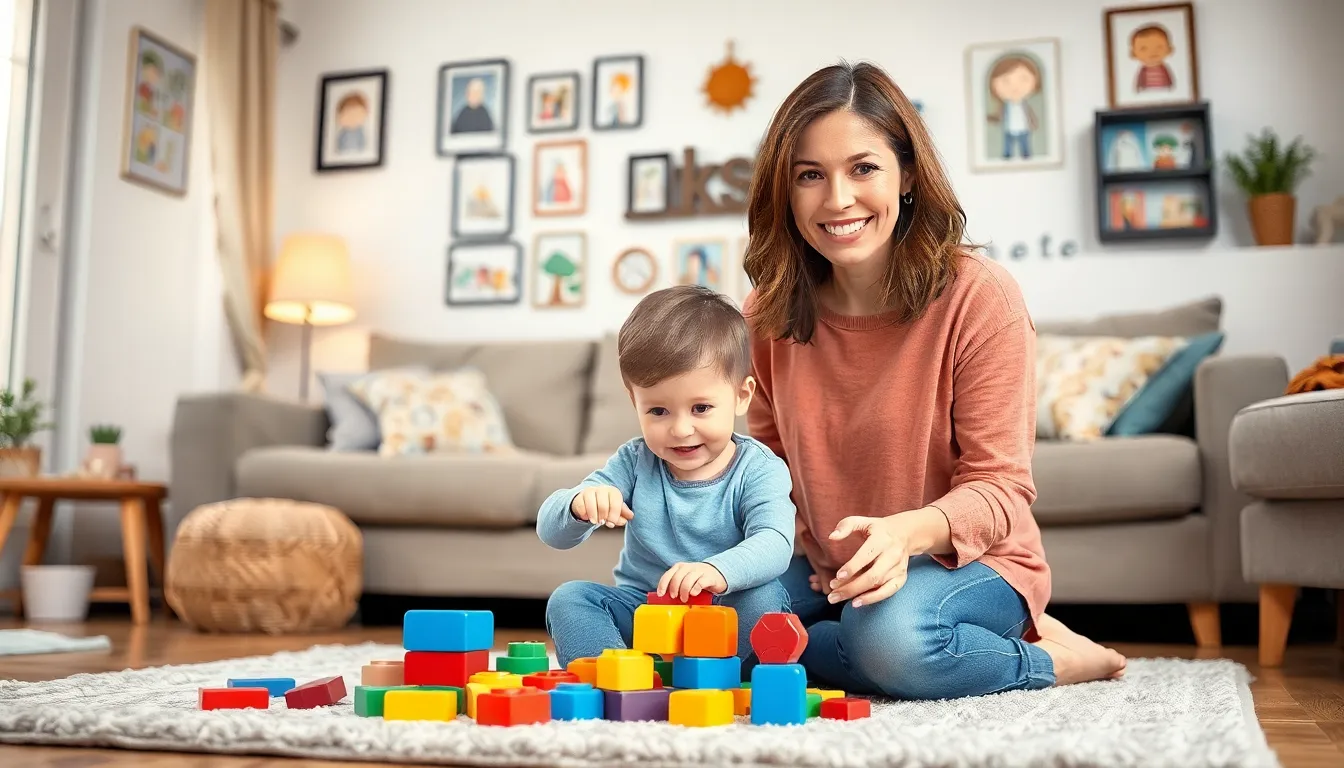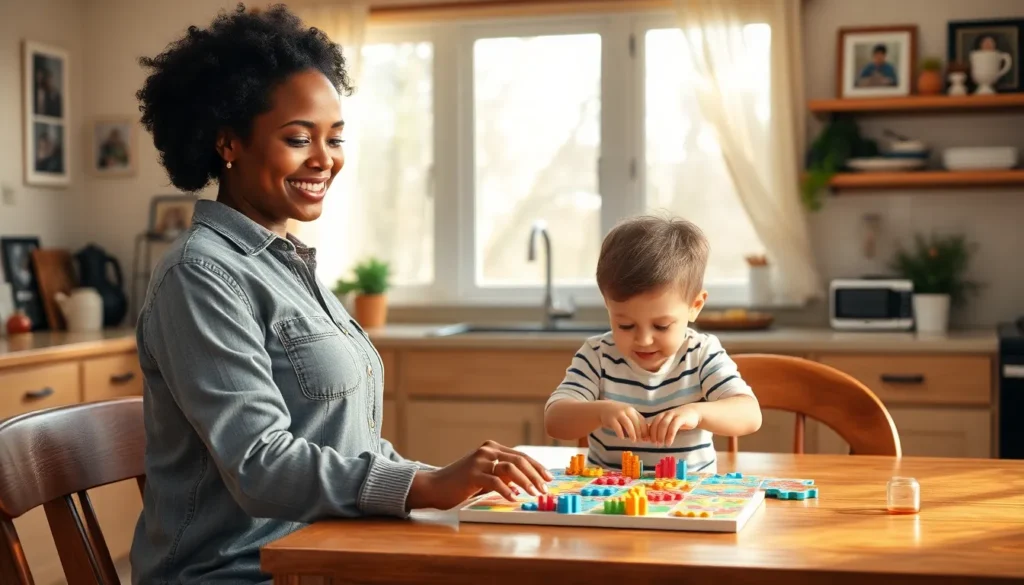Table of Contents
ToggleParenting can feel like a circus act, but not all performers are in the same show. Solo and single parenting may sound like interchangeable terms, but they’re as different as juggling flaming torches and spinning plates. Understanding these distinctions can help clarify the unique challenges and triumphs each type of parent faces.
Understanding Parenting Styles
Parenting styles vary significantly between solo and single parents, each with distinct characteristics. Solo parenting typically involves one individual who takes full responsibility for raising a child, often without a partner’s support. Single parenting, in contrast, can include parents who may share custody or engage with another parent, even if they do not reside together.
Solo parents face unique challenges, including managing childcare and household duties alone. They often become the sole decision-maker, influencing the child’s upbringing and daily routines. Emotional support systems generally depend on extended family, friends, or community resources. This parenting style demands high levels of independence and resilience.
Single parents experience different dynamics, where co-parenting arrangements often play a significant role. They might rely on their child’s other parent for support in various areas, including childcare and financial assistance. Having open communication with the other parent forms part of their routine, creating opportunities for collaboration in raising children.
Each parenting style brings distinct advantages and challenges. Solo parents may foster greater autonomy in their children by modeling self-reliance while navigating daily life challenges. Single parents can offer children balanced perspectives from both parents, enhancing their social interaction and relationship skills.
Understanding these unique attributes allows for better recognition of the needs and expectations associated with each style. Greater insights lead to improved support systems and resources, fostering healthier environments for children’s development.
Defining Solo Parenting

Solo parenting refers to an individual raising a child without the involvement or support of a partner. Often, this situation arises due to various circumstances, including divorce or the death of a partner.
Characteristics of Solo Parenting
Solo parents maintain full responsibility for their child’s upbringing. They make all decisions related to education, health, and daily activities. Scheduling and managing household tasks falls entirely on their shoulders. Many solo parents rely on extended family and friends for assistance, but the primary decisions reside with them. Independence often develops in children, as they learn to navigate life’s challenges without dual parental guidance. Additionally, solo parents may cultivate a single-parent household dynamic that promotes resilience and self-sufficiency.
Challenges Faced by Solo Parents
Challenges frequently align with time management. Solo parents juggle work, childcare, and household responsibilities without a partner’s assistance. Financial strain commonly presents obstacles as well, given single income sources. Emotional stress can intensify when facing parenting decisions alone without a co-parent’s support. Social isolation often affects solo parents, limiting their opportunities for friendship and support networks. Moreover, balancing personal needs while focusing on the child’s well-being poses continual challenges for solo parenting households.
Defining Single Parenting
Single parenting involves one parent raising their child independently, often sharing custody with an ex-partner. This arrangement allows engagement with both parents, which can positively influence a child’s development.
Characteristics of Single Parenting
Single parenting includes shared responsibility, which allows both parents to contribute to their child’s upbringing. Parents often communicate about educational and health decisions, providing a balanced perspective. Flexibility plays a key role; parents usually adjust schedules to accommodate visitations and family activities. Emotional support from extended family and friends can enhance the parenting experience. Furthermore, single parents frequently emphasize open dialogue with their children about family dynamics.
Challenges Faced by Single Parents
Single parents encounter various challenges impacting their daily lives. Managing finances becomes a primary concern as they navigate household expenses on a single income. Time constraints complicate balancing work responsibilities and parenting duties. Emotional stress can arise from feelings of isolation and the weight of decision-making alone. Accessing resources such as childcare and educational support often proves difficult, increasing the challenges. All these factors create a demanding environment that single parents must navigate while ensuring their children thrive.
Key Differences Between Solo and Single Parenting
Recognizing the distinctions between solo and single parenting can clarify the unique experiences each group encounters.
Support Systems
Support systems differ significantly for solo and single parents. Solo parents often find limited options for assistance, managing childcare and household responsibilities alone. Friends and extended family serve as the primary sources of support, yet reliance on them can vary. Single parents typically benefit from shared custody arrangements, allowing for structured cooperation with their ex-partners. Communication between both parents fosters a balanced environment. This collaboration enhances their children’s well-being while also alleviating individual parenting burdens.
Financial Responsibilities
Financial responsibilities present another major contrast. Solo parents shoulder the entire financial load, which can lead to challenges like budgeting and resource allocation. This responsibility often results in increased stress. On the other hand, single parents may share expenses with their ex-partners, allowing for potential financial relief. Joint financial planning can ease some burdens, although navigating child support agreements can be complex. Each situation demands careful financial management to ensure a stable environment for children’s growth.
Differentiating between solo and single parenting reveals the unique challenges and strengths inherent in each approach. Solo parents navigate their responsibilities largely on their own, fostering resilience and independence in their children. Meanwhile, single parents benefit from shared custody arrangements that can provide emotional and financial support.
Recognizing these distinctions is essential for understanding the diverse experiences of parents. By acknowledging the specific needs and dynamics of both solo and single parenting, society can better support families in their journey toward raising healthy and well-adjusted children. Each parenting style plays a vital role in shaping the next generation.




